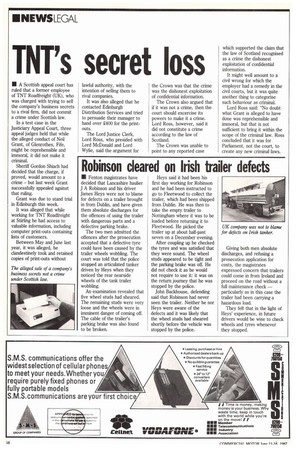TNT's secret loss
Page 18

If you've noticed an error in this article please click here to report it so we can fix it.
• A Scottish appeal court has ruled that a former employee of TNT Roaclfreight (UK), who was charged with trying to sell the company's business secrets to a rival firm, did not commit a crime under Scottish law.
In a test case in the Justiciary Appeal Court, three appeal judges held that while the alleged conduct of Neil Grant, of Glenrothes, Fife, might be reprehensible and immoral, it did not make it criminal.
Sheriff Gordon Shiach had decided that the charge, if proved, would amount to a crime – but last week Grant successfully appealed against that ruling.
Grant was due to stand trial in Edinburgh this week It was alleged that while working for TNT Roadfreight at Stirling he had access to valuable information, including computer print-outs containing lists of customers.
Between May and June last year, it was alleged, he clandestinely took and retained copies of print-outs without lawful authority, with the intention of selling them to rival companies.
It was also alleged that he contacted Edinburgh Distribution Services and tried to persuade their manager to hand over 2400 for the printouts.
The Lord Justice Clerk, Lord Ross, who presided with Lord McDonald and Lord Wylie, said the argument for the Crown was that the crime was the dishonest exploitation of confidential information.
The Crown also argued that if it was not a crime, then the court should excerc-ise its powers to make it a crime. Lord Ross, however, said it did not constitute a crime according to the law of Scotland.
The Crown was unable to point to any reported case which supported the claim that the law of Scotland recognised as a crime the dishonest exploitation of confidential information.
It might well amount to a civil wrong for which the employer had a remedy in the civil courts, but it was quite another thing to categorise such behaviour as criminal.
Lord Ross said: "No doubt what Grant is alleged to have done was reprehensible and immoral, but that is not sufficient to bring it within the scope of the criminal law. Ross concluded that it was for Parliament, not the court, to create any new criminal laws.
























































































































